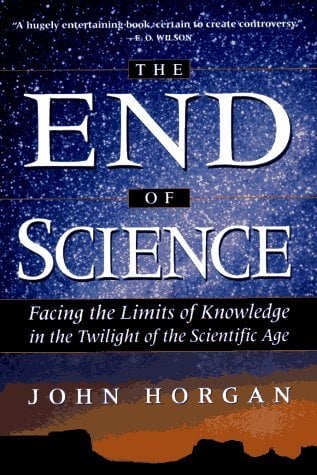In The End of Science, John Horgan, a staff reporter for Scientific American, writes about his encounters with both scientists and philosophers of science and concludes that modern science is coming to an end.
In every significant field of scientific research, from neuroscience to cosmology, theory has reached so great an impasse that new breakthroughs seem impossible. Although Morgan’s approach relies more on the testimony of the scientists themselves than on analysis of their theories, his argument is, nonetheless, convincing, as he recounts, for example, the frustration of physicists who cannot yet cobble together a theory that combines electromagnetism with gravity, or quantum indeterminacy with relativity. The latest contender for a “TOE” (“theory of everything”) is “superstring theory,” which assumes that sub-atomically short “strings” exist in ten dimensions, a theory so abstract and complex that it has only the most indirect connection with the world of common experience. Furthermore, testing such fundamental physical theories requires an atomic accelerator called the “Supercooled SuperCollider,” a project so expensive that the federal government refused to continue its funding after spending five billion dollars on it. The End of Science is foretold as much by economic constraints as by the impasse of theory.
On the other hand, Morgan’s reportorial stance has led him to approach science, and its place in our culture, as other reporters treat their fields; he is as cynical as a war correspondent, and as addicted to the derogatory tag line at the end of an interview as the worst television reporters. He suspects that scientists are not worthy of their reputations, although the author himself has no more experience of conducting a scientific experiment than Sam Donaldson does of running a presidential campaign. More seriously, Horgan fails to consider the cultural implications of his conclusions. With the “end of science,” the entire Enlightenment project—which includes capitalism, individual rights, mass education, rationalism, and representative government—is brought into question.
Nevertheless, he does arrive at a conclusion that befits his background as a former student of literary criticism. Unable to proceed to any further major discoveries, modern science, Morgan believes, has become “ironic” science. “The most important function of ironic science is to serve as humanity’s negative capability. Ironic science, by raising unanswerable questions, reminds us that all our knowledge is half-knowledge; it reminds us of how little we know. But ironic science does not make any significant contributions to knowledge itself. Ironic science is thus less akin to science in the traditional sense, than to literary criticism—or to philosophy.” But “ironism” means the acceptance of relativism as the basis of human existence, in which multiple and discordant descriptions of reality are possible. Ironism, having infected literary criticism and political philosophy, now threatens science, which has stood as the validator of truth in the Enlightenment tradition, and the proof that the human mind could attain to an ultimate foundational reality. Science is slowly giving up its status as guarantor of truth, however; for it is riven not so much by the attacks of multiculturalists and deconstructionists as by the spectacle of theoretical impasse apparent in so many of its disciplinary fields.
It is important to see what possibilities lie beyond The End of Science besides “ironism,” which is after all a form of resignation, of the despair that comes with finding truth, carrying with it the conviction that we cannot “know” any truth at all. Independent of other principles, science is unable to maintain its own code of values, which includes honesty, publicity for the results of research, diligence, and rationalism: that is the true implication of Morgan’s thesis. Potentially, the “end of science” is the final nail in the coffin of Western culture, leaving us stranded without hope of apprehending truth, exercising reason, or justifying standards of morality.
[The End of Science: Facing the Limits of Knowledge in the Twilight of the Scientific Age, by John Morgan (Reading, Massachusetts: Helix Books/Addison-Wesley) 309 pp., $24.00]

Leave a Reply